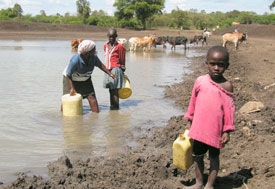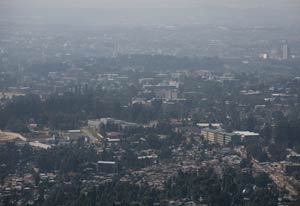Fogarty launches GEOHealth environmental and occupational research and training hubs
September / October 2012 | Volume 11, Issue 5

Photo by Greg Allgood/Photoshare
Fogarty's new program is intended to curb
environmental and occupational illnesses in
developing countries.

Photo by Richard Lord
Planning grants from Fogarty's GEOHealth program will
fund 16 new research centers across the globe,
including a project focused on air pollution in Ethiopia.
Contaminated air, water, soil and food remain a major cause of untold numbers of illnesses around the world each year. The problem is particularly acute in developing countries, where exposures to indoor air pollution from cooking fires, pesticides, radiation, tainted water and climate change contribute to nearly a quarter of all deaths and illnesses. In addition, workers globally face many occupational risks such as injuries and contact with hazardous conditions.
Many low-resource countries lack the expertise to study the linkages between these risk factors and disease. To rectify this, Fogarty is launching the
Global Environmental and Occupational Health (GEOHealth) program, in partnership with the NIH's National Institute of Environmental Health Sciences (NIEHS) and the CDC's National Institute for Occupational Safety and Health.
GEOHealth is intended to create regional hubs for collaborative research, data management, training and policy support regarding environmental and occupational health research in low- and middle-income countries.
To support planning for the hubs, $3.2 million is being awarded in two-year grants for activities in more than 15 countries. Each hub will be managed by a pair of institutions - one from the U.S. and one from the host country - with both receiving direct awards.
The GEOHealth projects cover a wide range of topics that build on existing strengths within the consortia and tackle local priority health needs. The planning grants will allow partners to conduct needs and opportunities assessments, prepare for policy-relevant research and training, and foster partnerships that can be sustained through the program's next phase. The multidisciplinary centers will lead collaborative research and training in fields such as epidemiology, biostatistics, genetics, environmental science, industrial hygiene, systems science, toxicology, behavioral science and implementation science.
A hub in Bangladesh will focus on water contamination, indoor air pollution caused by cooking and heating fuels, and urban smog. A consortium in Ethiopia will target not only indoor and outdoor air quality, but also climate change and occupational health with an emphasis on agriculture. Meanwhile, in Uganda, food safety and hygiene, water quality, work-related injuries and health worker exposure to biological contaminants are the subjects of interest.
In the remote and heavily deforested jungle of Peru's Alto Mayo region, a multidisciplinary team will study the quality and safety of traditional medicines prepared from native plants, among other subjects. A collaborative effort in Suriname will examine the effects of environmental contamination on indigenous medicinal plants and the detrimental impact of gold mining on fish and other local food sources.
More Information
2012 GEOHealth Hubs Planning Grants
Access full details for each of the GEOHealth Hubs planning grant awards in NIH RePORTER.
-
Bangladesh: Bangladesh Center for Global Environmental and Occupational Health
-
Chile: Planning for a Global Environmental Health Hub based in Chile
-
China: Air Pollution-Children's Health GEOHealth Hub in China
-
China: Planning a Regional China GEOHealth Hub
-
Colombia: An Environmental and Occupational Health Research and Training Hub
-
Colombia: Colombia-Texas GEOHealth Hub Collaborative
-
Ethiopia: Establishing a GEOHealth Hub Platform for East Africa
-
The Gambia: GEOHealth Development of the West Africa GEOHealth Hub: The Gambia
-
Ghana: The West Africa-Michigan CHARTER for GEOHealth
-
Nicaragua: A GEOHealth Hub for Agriculture and Informal Work in Nicaragua
-
Peru: Exploratory Planning for a Proposed GEOHealth Hub in the Alto Mayo Region
-
Romania: One Health Center for Environmental and Occupational Research
-
Suriname: Caribbean Consortium for Research in Environmental and Occupational Health
-
Thailand: Occupational Health Research, Policy and Capacity Building in Thailand
-
Uganda: Planning for A GEOHealth Research and Training Hub in Uganda
-
Ukraine: Building on Excellence: An Interdisciplinary GEOHealth Hub in Ukraine
To view Adobe PDF files,
download current, free accessible plug-ins from Adobe's website.